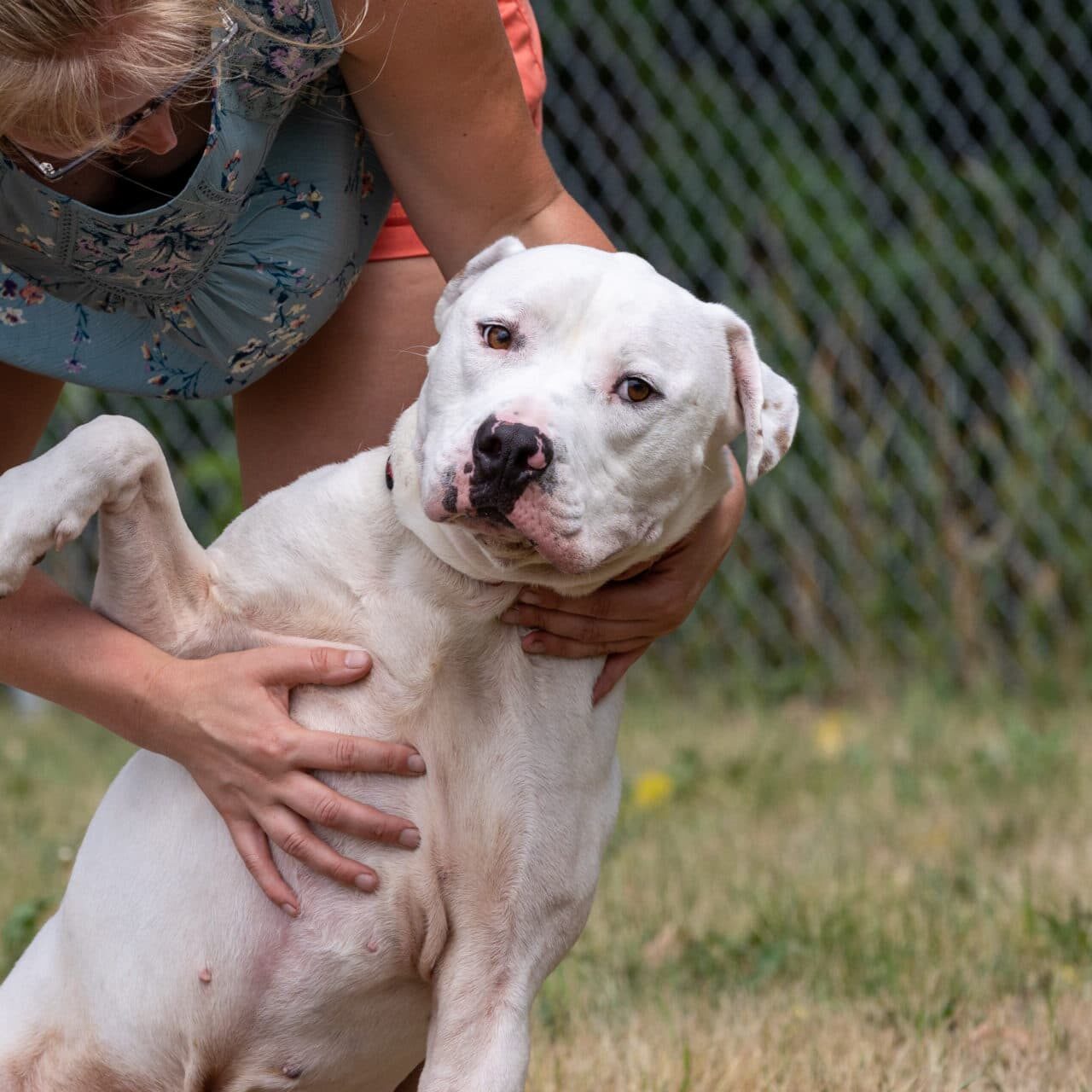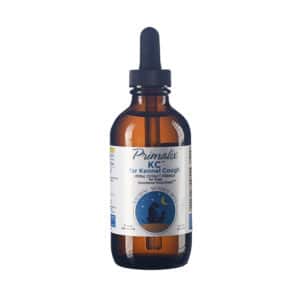Kennel Cough in Dogs
Think about it. Thousands of years ago when dogs came down with coughs, what did they do? They instinctively sought out healing herbs in the wild, consuming some for cleansing and others for medicinal powers.
Today, kennel cough is a common, upper respiratory disease that is extremely contagious, hence its name describing its tendency to spread rapidly through boarding facilities and other kennels.

The condition is known medically as tracheobronchitis, canine infectious tracheobronchitis, Bordetellosis, or Bordetella. Kennel cough is caused by a combination of bacteria and viruses which infect and irritate the sensitive lining of the airway including the trachea and bronchi.
Symptoms of Kennel Cough
Fortunately, kennel cough is rarely life-threatening; however, it can be very uncomfortable for your dog and frustrating for you. As your dog breathes, the air passing over the irritated nerve endings of your dog's airway causes a rough, dry, hacking cough that often ends in retching or gagging. This cough is very frequent, occurring every few minutes throughout the day and even into the night. Coughing may or may not be accompanied by a watery nasal discharge.
Most dogs maintain normal body temperature and appetite and are alert and interactive throughout the illness. More severe cases, or dogs who are weak when they are infected, may become lethargic, develop a fever, lose appetite, and in the most severe cases develop pneumonia, which can be fatal.
Clinical signs of kennel cough generally appear 2 to 12 days after exposure and last from a week to 21 days. Dogs will continue to be infectious for up to 14 weeks after the infection has cleared from their system.
Kennel Cough Diagnosis
The dry hacking cough that characterizes kennel cough is so distinctive that veterinarians can usually identify the disease by the cough. If your dog has been exposed to other dogs, especially in a kennel environment, most veterinarians won't need much more for diagnosis. Some veterinarians may recommend viral isolation and identification, bacterial cultures, and blood work if they are particularly aggressive or if your dog has not been exposed to other dogs.
There are other diseases that can look like kennel cough. Both respiratory and cardiac diseases can cause a hacking cough. Blastomycosis, Valley Fever, Heartworm and other cardiac diseases should be carefully ruled out by your veterinarian.
Conventional Treatment of Kennel Cough
Many dogs recover from kennel cough without treatment, but your veterinarian may recommend antibiotics and antivirals in order to help your dog heal faster. Since kennel cough is caused by both bacteria and viruses, your dog will need quite a cocktail of medication in order to make a difference. This can lead to bacteria and viruses that are resistant to antivirals and antibacterials, so if your dog becomes infected again it could be a lot worse.
Nature's Prescription for Kennel Cough
In nature, dogs seek out herbs to fight bacteria and viruses and naturally heal their bodies. In fact, early humans learned how to use plants medicinally in part by watching animals seek out certain plants for certain ailments.
Now that our dogs are domesticated, they don't have the opportunity to seek out herbs the way dogs may have done in the past. You may notice your dog chewing on grass when she doesn't feel well, but your yard doesn't have the range of healing herbs that she might have found in the wild.
It is essential that we provide the kind of natural herbal healing power our dogs would have found on their own in the wild. Our proprietary blend of specific herbs will feed and nourish the whole body, giving your dog natural wellness without worry of building resistance to bacteria or viruses.
Kennel Cough in Dogs Is Nothing New
Nature has been handling the problem for thousands of years. And kennel cough does not have to involve drugs, chemicals, side effects or even leaving the safety and comfort of your home.
Primalix® KC for Dogs
- Primalix® KC is safe and effective for all dog breeds
- Eases the irritation of kennel cough so your dog’s recovery will be easier
- Does not build antiviral or antibiotic resistance
- Specific herbs that have been used historically for cough
- Easy to use Functional Food DropsTM that can be added to your dog's food or given orally
Natural Ingredients
Echinacea (Echinacea purpurea) has been used for the treatment of the common cold as well as a wide range of other infections for thousands of years throughout North America, where it is native. It can be taken orally as a dietary supplement, used fresh or dry in teas, and used topically for infections of the skin.
Research shows that taking Echinacea while well may reduce chances of catching a cold. It also boosts the production of T-cells by up to 30 percent more than immune-boosting drugs. Echinacea contains echinacoside, a natural antibiotic with many of the same properties of penicillin. This is how it is able to kill such a broad range of viruses, bacteria, and other infection.
Please see the footnotes below on a few of the randomized, placebo-controlled, double-blind clinical trials by medical researchers, microbiologists and holistic veterinarians. 1, 2, 3, 4, 5, 6, 7, 8
Coltsfoot flower (Tussilago farfara) is the basis for many of the herbal cough remedies used traditionally and still widely accepted in Europe today. For thousands of years it has eased dry, racking coughs as well as chronic or acute bronchitis worldwide. It is even specifically recommended by the British pharmacopoeia for chronic bronchitis. This herb has a soothing expectorant effect that reduces the frequency of the cough, as well as an antispasmodic action that makes coughs less rough in dogs infected with kennel cough.
Marshmallow (Althaea officinalis) is abundant in mucilage acting as a demulcent to soothe the inflamed and irritated mucous membranes of your dog's throat. Marshmallow root has been referenced as a healing herb since the times of Homer's Iliad. Modern clinical studies have found antimicrobial activity in Marshmallow root against a range of bugs including Pseudomonas aeruginosa, Proteus vulgaris, and Staphylococcus aureus. Abundant mucopolysaccharides mildly stimulate your dog's immune system causing healing to progress more rapidly.
Mullein flower (Verbascum thapsus) works well with other herbs to treat kennel cough. It reduces inflammation and stimulates the production of fluid to facilitate expectoration. This herb is specifically effective for bronchitis that is characterized by a very hard cough and inflammation of the trachea such as we find with kennel cough.
Recommended Products
Key Benefits
- Comforts and soothes so your dog will be more comfortable during recovery
- Energizes the immune system to combat harmful microorganisms
- Free of harmful side effects, antiviral and antibacterial resistance
- Can be safely used throughout your dog's illness
Dosing Instructions
- Kittens and small cats (up to 5 lbs.): 1/4 dropper (5 drops) three times daily
- Cats and small dogs (up to 20 lbs.): 1/2 dropper (10 drops) three times daily
- Medium dogs (21 to 60 lbs.): 1 dropper (20 drops) three times daily
- Large dogs (61 to 100 lbs.): 2 droppers (40 drops) three times daily
- Giant dogs (101 lbs. and up): 3 droppers (60 drops) three times daily
NOTE: One "dropper" equals one squeeze of the black bulb (1.0mL), which fills the pipette about half full. Refrigerate after opening.
NOTE: Primalix KC ® is not recommended for pregnant or nursing animals. Primalix KC ® is most effective when given on an empty stomach.
Insert dropper into pet’s mouth and squeeze bulb to discharge. Or, simply add to food as directed. Make sure your dog has plenty of fresh drinking water available (please use only filtered or distilled water). Give dosage evenly throughout the day, but avoid giving at the same time prescription drugs are given. Average treatment time is 5 to 10 days.
Our Return Policy on This Item
Due to the highly contagious nature of Kennel Cough, we cannot accept returns of Primalix KC once the product leaves our facility, even if the bottle has not been opened. No returns, no exchanges. Sorry.

